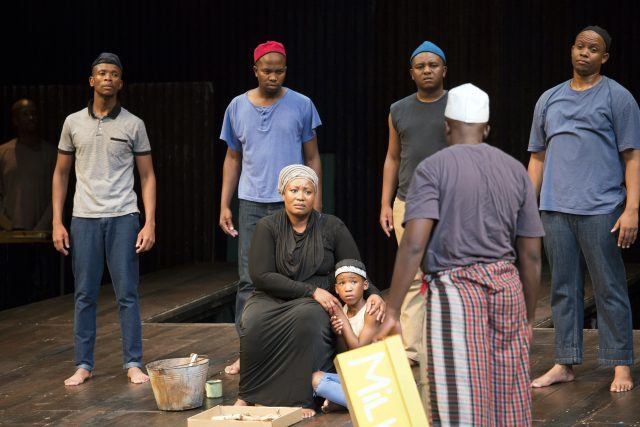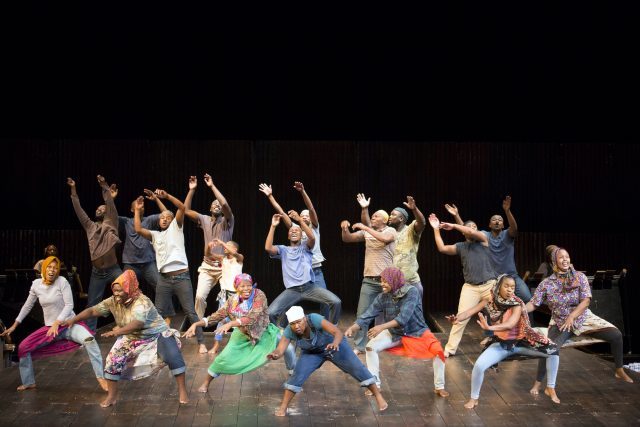
Yindy (Pauline Malefane) and Asad (Siposethu Juta) face some hard truths in A MAN OF GOOD HOPE (photo by Rebecca Greenfield)
BAM Howard Gilman Opera House
30 Lafayette Ave. between Ashland Pl. & St. Felix St.
February 15-19, $24-$80
718-636-4100
www.bam.org
The second time South African writer Jonny Steinberg met Asad Abdullahi, he observed how the Somali refugee became wistful after snapping a twig and smelling its sap. “I felt a whim rising. A man who can break a twig and take me with him to another world, I thought, is a man about whom I ought to write a book,” Steinberg explains in a program note about A Man of Good Hope, a musical drama based on his 2015 book making its U.S. premiere at BAM February 15-19. Presented by London’s Young Vic and Cape Town’s Isango Ensemble, A Man of Good Hope follows Asad from his early childhood in Mogadishu, where his mother (Zanele Mbatha) is shot in cold blood right in front of him, to his attempts to settle in Kenya, Ethiopia, Tanzania, Zimbabwe, and South Africa while dreaming of escaping all the hardships and living in America. Asad is played by Siposethu Juta or Phielo Makitle, Zoleka Mpotsha, Luvo Tamba, and Ayanda Tikolo as he grows into a man, constantly encountering a stream of new people, both friends and enemies, and struggling to survive, always looking over his shoulder, aware of ever-present danger. Many of the people he meets disappear from his life; his acquaintances and relatives end up brutally murdered, and relationships are as evanescent as the cash in his hand. However, despite the serious nature of his story, A Man of Good Hope is filled with humor and joy. “His fear crossed a boundary right then and inhabited me,” Jonny (composer and conductor Mandisi Dyantyis) says early on about Asad. “I saw what he saw and felt what he felt. It was a gift. In that moment he gave me the ink with which I have written this book.”

Cape Town’s Isango Ensemble excels in BAM presentation of A MAN OF GOOD HOPE (photo by Rebecca Greenfield)
The set consists of a central angled wooden platform with two small stairs at the back for entries and exits; along both sides are seven marimbas, played by various members of the twenty-three-person troupe. When they’re not on the platform, the cast watches from the right and left, occasionally chiming in like a Greek chorus. The dialogue is mostly in English with some lines in African languages; in addition, the characters occasionally speak in operatic tones or break into full-fledged songs featuring traditional melodies and movement (by Lungelo Ngamlana). Director Mark Dornford-May uses freestanding doorways to depict border crossings on the characters’ journeys, or attempted journeys, to other countries, evoking the current refugee crisis and xenophobia so prevalent around the world as well as, serendipitously, the new American president’s desire to build a wall between Mexico and the U.S.A. Dornford-May, the cofounder and artistic director of Isango, also employs creative ways to show travel by car and the transformation of Asad as he ages. And the costumes, so colorful in the first half, make a very specific shift after intermission. The fine, barefoot cast also includes Dyantyis as Steinberg and the conductor, music director and Isango cofounder Pauline Malefane as Yindy and Sadicya, Sindiswa Sityata as Yindy’s mother, Ayanda Eleki as Yindy’s father, Khanya Sakube as Tube, Zamile Gantana as Rooda, Busiswe Ngehame as Foosiya (just wait till you hear her ring tone), Luvo Rasemeni as Zena, Sonwabo Ntshata as Kaafi, Cikizwa Ndamase as Zulfa, Sifiso Lupuzi as Madoda, and Thobile Dyasi as Abdi. (We saw Juta as the eight-year-old Asad, and he was exceptional, reaching emotional levels far beyond his years.) The ambiguous ending is followed by exuberant curtain calls, everyone dancing and smiling, a testament to the stubborn persistence of the human capacity for happiness amid the harsh and heartbreaking conditions we continually create for each other and ourselves.